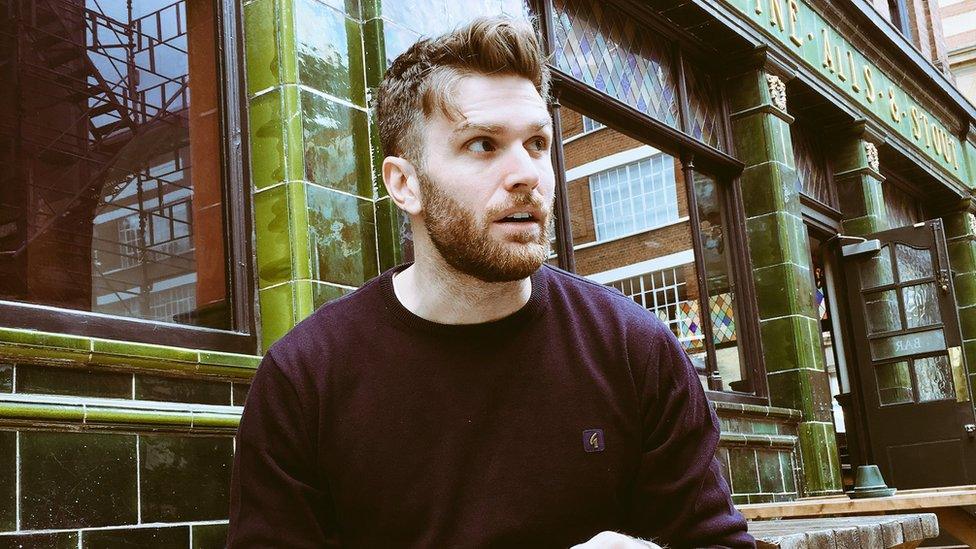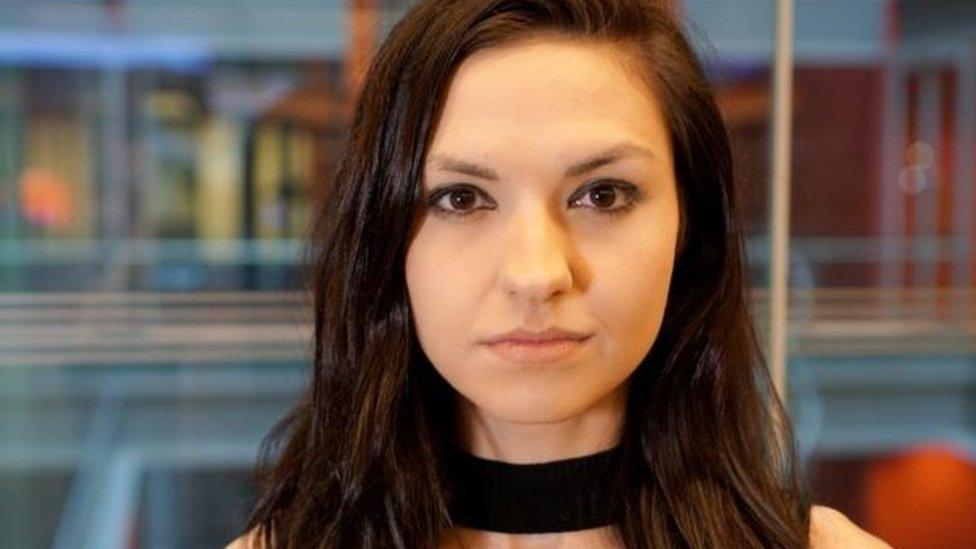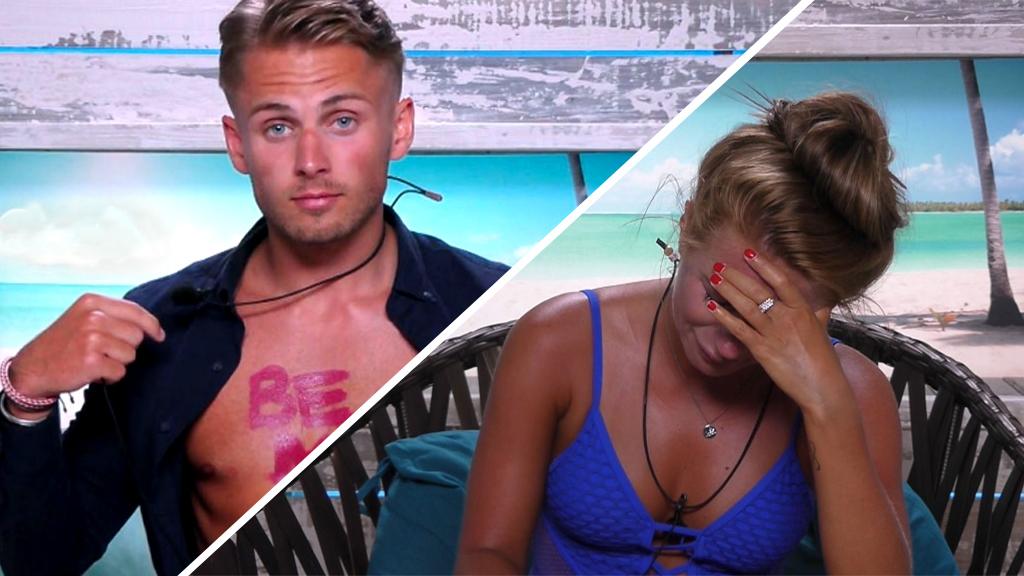Love Island's Zara: Revenge porn victims need anonymity
- Published

Zara McDermott was victimised during her time on Love Island this year
Love Island contestant Zara McDermott has told BBC Radio 5 Live that revenge porn victims need to be "given the option" of choosing to remain anonymous.
The 21-year-old says she has been a victim twice, most recently during her time on the ITV2 reality show.
McDermott says advances in technology have meant sending images "is a new way of having sex".
"Victims need to be given the choice to remain anonymous, because they never got the choice on whether to release the photos," she says.
New research given to 5 Live by the North Yorkshire Police and Crime Commissioner shows 3% of revenge porn victims surveyed had successfully prosecuted an offender.
The findings also show 76% of victims say they did not report their crime to the police, but nine in 10 say they would have reported it if they had been assured anonymity.
Revenge porn, which was made a criminal offence in 2015, is currently categorised as a "communications crime", meaning victims are not granted anonymity.
Julia Mulligan, North Yorkshire Police and Crime Commissioner, launched a petition to change the law, as is the case for complainants in sexual offence cases.

Ms Mulligan says the lack of anonymity means victims can be wary of reporting the crime, particularly with "high profile victims".
McDermott says she first experienced revenge porn when she was at school, after a boy circulated an explicit photo she had sent him.
"I didn't know he had sent it round to other students until I was sat in class and a boy from school held the photo up to the window on his phone," she recalls.
"I remember having a total meltdown and the rest being a blur - it was a really dark time in my life."
She says she was excluded by her school for sending the explicit image, but the boy who shared it was not.
"The term revenge porn wasn't around then, and girls were always seen as the ones in the wrong for sending the pictures in the first place," she remembers.
The second time she found herself a victim was this year during her time on Love Island, when intimate photos were leaked supposedly by an ex-partner.
The images were shared with his friends and they then surfaced online.
"There are still people who say if you don't want this to happen, don't send a picture - but sending pictures isn't a terrible thing to do.
"You just need to teach people to do it safely," she adds.
McDermott says anonymity for victims would "help people continue to live a normal life".
She is dating Adam Collard, who she met on the show and the images have had a deep impact on him, she says.
"It's almost affected him even more than me, because he finds it so difficult knowing that people have treated me so badly in the past."
Dr Afroditi Pina is a senior lecturer in forensic psychology at the University of Kent. She says victims of revenge porn often report high levels of "self-blame".
"Culturally, we see women being tasked with the responsibility of preventing their own victimisations in all possible scenarios.
"A perpetrator is always to blame for having made the choice to act," she explains.

Joel Dommett says he was blackmailed over an intimate video
'Someone was watching me watching porn'
Comedian Joel Dommett had an intimate video leaked. It happened a week before he flew out to be a camp mate in the I'm A Celebrity jungle in 2016.
Dommett, who is now a host on the series' Extra Camp show, says he was catfished [deceived by a fake profile on social media] into having Skype sex after being contacted on Twitter by a new follower called Staci Taylor.
Writing about his experiences for BBC Three, Dommett says he tried to message Staci several times afterwards but received no reply.
Two years later, Dommett reported that a Twitter account was following him and said its owner had possession of explicit images.
"So it turns out I wasn't having Skype sex at all, instead someone was basically watching me watching porn. Like a perverted Gogglebox."
The owner of the account tried to blackmail Dommett into paying money to prevent the images being released, but he refused.
"I obviously knew that no matter how much I pay it wouldn't make anything go away," he wrote.
Dr Pina says men who experience revenge porn undergo a "similar psychological impact" to that of women.
"Victims can experience anger, guilt, humiliation, embarrassment and paranoia - as well as feelings of powerlessness," she says.

Chrissy Chambers won her revenge porn case in January
'When I saw the video I dropped to the ground'
While neither Dommett nor McDermott brought charges against the people who targeted them, US YouTuber Chrissy Chambers made headlines in January 2018 when she won her revenge porn case against an ex-boyfriend.
She was awarded damages from the British man, who posted videos online of them having sex in 2013.
Chambers says she was not aware of the videos, which were filmed in 2009 when she was 18 without her consent.
In 2013, a friend got in touch to tell her someone was posting links to a pornographic video of a woman that appeared to look like her.
"When I clicked the link and immediately recognised my old room, my bed, my face, I literally dropped to the ground," she remembers.
Chambers says the psychological impact has been "permanently life-altering".
"I couldn't function, I couldn't focus, I couldn't go a day without thinking about what had happened to me hundreds of times."
"We lost tens of thousands of followers - it was like an exodus - because someone was posting these videos over and over and sending them to our fans."
But, Chambers says, using her platform to help other victims and speak out has helped her to cope.
"If I had been working a normal job and had a smaller bubble, I honestly don't even know if I would have survived."
After the court case, Chambers proposed to her now wife, Bria, on the steps of the court. Chambers realised she was gay in 2011.
"It [the revenge porn case] tore apart my relationship, which is why I proposed as soon as the case concluded," she says.
Allow X content?
This article contains content provided by X. We ask for your permission before anything is loaded, as they may be using cookies and other technologies. You may want to read X’s cookie policy, external and privacy policy, external before accepting. To view this content choose ‘accept and continue’.
Dr Afroditi says a lack of anonymity for victims can be a "great deterrent" to coming forward and reporting the crime.
Chambers, who is now an activist for victims, agrees.
"It's not just the gift of anonymity - to a victim, it's the gift of survival."
BBC Radio 5 Live is hosting the #sextakeover, a day of programming focused on our sexual behaviour, relationships and attitudes, in Sunderland on 20 November 2018.
- Published26 July 2018

- Published31 July 2018
